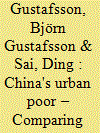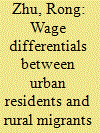| Srl | Item |
| 1 |
ID:
192330


|
|
|
|
|
| Summary/Abstract |
Using data from the China Household Income Project in 2013 and 2018, this paper studies relative poverty among rural hukou holders living in urban China and urban hukou holders. People living in households with an income below a fixed percent of the median per-capita income and wealth below the same fixed percent of the median per-capita wealth among urban residents are deemed as relative poor. Although migrants with rural hukou living in urban China were more prone to twice poverty than urban residents in 2013, this was not generally the case in 2018.
A multivariate analysis shows several factors to be related to the probability of being twice relative poor. Even considering these factors, a rural hukou status increased the probability of being twice relative poor in 2013. In contrast, such an excess risk of being twice relative poor was much lesser outspoken in middle and low-ranking cities in 2018. However, rural to urban migrants living in high-ranking cities had a somewhat higher risk of being relative poor than urban residents with the same characteristics in 2018.
|
|
|
|
|
|
|
|
|
|
|
|
|
|
|
|
| 2 |
ID:
158631


|
|
|
|
|
| Summary/Abstract |
Through an analysis of the data collected by China General Social Survey (CGSS) on urban residents in 2005, this study finds out that the factors of social network and reciprocity that affected social capital are significant positive predictors of political participation within and outside the system in Chinese cities. And it also finds out that the exposure to news in media use is also a significant positive predictor of political participation within and outside the system. However, time for watching television is the only positive predictor for partial political participation within the system. The results reveal that the impact of media use on the political participation of urban residents depends on exposure to news rather than the time of media use. The theoretical contribution of this study is that exposure to news in media use is still a significant positive predictor for the political participation of urban residents, even after controlling the variable of social capital and other factors. This implies that political participation is related to social capital, which stems from interpersonal communication, as well as news use, which stems from mass communication.
|
|
|
|
|
|
|
|
|
|
|
|
|
|
|
|
| 3 |
ID:
145886


|
|
|
|
|
| Summary/Abstract |
Using data from a 2011 national household survey, this study examines the factors shaping urban residents’ prejudice toward rural-to-urban migrants and the impacts of prejudice on rural migrants’ integration into urban communities. The author addresses the endogeneity of the prejudice variable by employing an instrumental variable method. The results show that urban residents with higher education and household income report stronger prejudice. Also, urban residents with urban hukou at birth are more prejudiced toward rural migrants. Given that hukou status at birth is tied to parental hukou status, this result implies that prejudice can be transferred across generations. With regards to rural migrants’ integration into urban communities, high levels of prejudice in one’s current county of residence reduces perceived social standing of rural migrants and increases the number of livelihood problems they encounter. The author also conducts a falsification test, which provides support that the effect of urban residents’ prejudice on rural migrants’ integration is causal.
|
|
|
|
|
|
|
|
|
|
|
|
|
|
|
|
| 4 |
ID:
147407


|
|
|
|
|
| Summary/Abstract |
This paper examines the wage differentials between urban workers and rural migrants in China's urban labor market. The wage differentials between the two groups are found to be higher at the top end than at the bottom part of the wage distribution in both 2002 and 2007. We decompose the distributional wage differentials between the two groups into a composition effect explained by differences in productivity characteristics, and a discrimination effect attributable to unequal returns to those characteristics. We find that the discrimination against migrant workers increases with the percentile of wage distribution in both 2002 and 2007. We also show that the discrimination against rural migrants has intensified during 2002–2007 throughout the wage distribution.
|
|
|
|
|
|
|
|
|
|
|
|
|
|
|
|